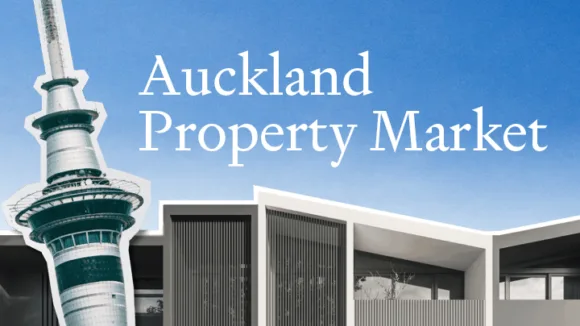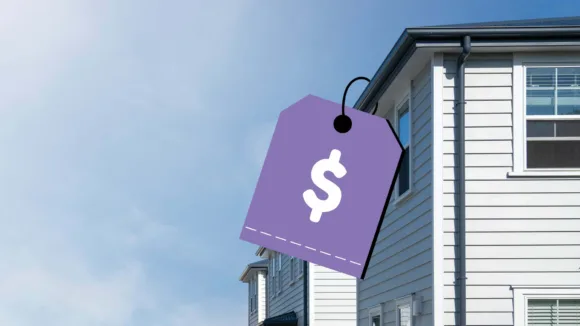
Property Market
Auckland house prices | How is the Auckland property market going?
Gain insights into Auckland's property market with updated statistics on house prices, rental trends, and investment opportunities.
Property Market
2 min read

Author: Ed McKnight
Resident Economist, with a GradDipEcon and over five years at Opes Partners, is a trusted contributor to NZ Property Investor, Informed Investor, Stuff, Business Desk, and OneRoof.
Reviewed by: Laine Moger
Journalist and Property Educator, holds a Bachelor of Communication (Honours) from Massey University.
The average house price in New Zealand is $907,274 as at Nov 2025. Over the last 12 months this has decreased by 0.10%.
Want to see the most recent numbers for your specific council area? You can find the data for every single part of New Zealand in the table below. These numbers are updated every month.
For instance, if you look at Auckland, the table shows that the average property price is $1,201,504. That is down 3.00% year on year (-$37,178).
Compare that to Hamilton, which is up 1.15% year-on-year. Property values there have gone from $783,681 to $792,656 (+$8,975).
Looking to the South Island, Christchurch property values are up $23,488 (3.08%). The average house value in Christchurch is now $786,671 (November 2025).
Some people often ask me – "Ed, are those squiggly blue lines actual house prices?" The answer is yes. Those blue lines do show house prices over the last 12 months. They're called sparklines. And I like to include those to give you a quick sense of how house prices are moving.
Although house prices may have gone up 2% (or down 5%) over the last 12 months, that doesn't tell the whole story. It doesn't show how house prices are moving month to month. So, those sparklines help to give you more context about what's happening in your area.
If you want a broader view of house prices around New Zealand, keep reading below. You’ll learn where the most and least expensive houses are and how the data is calculated.
If you have a question, write your questions or thoughts in the comments section below.
The average house price in NZ is currently $907,274 as at November 2025. This is down from the $908,173 12 months ago.
That means that house prices are down $899 over that time.
Loading...
If you’re looking to buy one of the cheapest houses in the country you need to go to the Hawke's Bay region.
The cheapest house prices in New Zealand are located there according to November 2025 data.
The 3 cheapest districts across New Zealand are:
At the other end of the scale, the 3 most expensive areas have average house prices in the 7 figures. The 3 most expensive areas are:
If you Google “average house price” you will find the figures differ slightly, depending on who you talk to.
Why? It’s all down to the data used.
For instance, the data for this article was taken from QV, and the prices shown will be slightly different from other sources, for example CoreLogic and REINZ.
There are a few reasons for this and it comes down to how the data is calculated.
For starters QV creates its average by:
CoreLogic used to follow a similar process. But, now they use a house price index. So the numbers they report will be different.
Next is REINZ, which is another very popular data source. They calculate their data by:
This is different from QV because:
The effect of this is that REINZ median sale prices are more volatile (there will be more variation month to month).
REINZ reported median sale prices are also typically lower than QV’s data.
For example, while QV said New Zealand’s average price was $907,274, REINZ put the median sale price at $786,000.
Both are right, but there is a $121,274 difference between what QV and REINZ Price say what the average house price is.
This is important to bear in mind as you are using different sources to figure out the average price for an area.
Want to check out data on your region? Check out our Area Analyser. You can get free data for any suburb, council area or region in New Zealand.
You might think that looking at the average house price data might be quite boring. But this impacts real people and their money lives.
I’d just finished speaking at an event in Christchurch when a pair of first-home buyers approached me. They were in their late 20s and wanted to start a family.
But they really wanted to buy a house first.
They’d tried to get a foot on the property ladder a few years back. But the bank said no. They couldn’t borrow enough to afford the house they wanted.
What happened next changed the way I think about data.
They came up to me and said: “Ed, it shocked us when you showed that graph of the average house price in Christchurch falling. We didn’t realise that house prices went down over $80 grand in a single year!
“We tried buying a house before but couldn’t get the bank to say yes. Our deposit will go way further now. We’re going to talk to our mortgage broker tomorrow.”
That happened back in mid-2023. So, the numbers have changed now.
But, 2 months later, I was sitting at my desk. And an email pops into my inbox.
They’d just had an offer accepted on a property and were looking forward to moving in.
The point is – you might look at the numbers on this page and think they’re a bit nerdy or academic. But, seeing this data changed everything for those first-home buyers.
So, what could this data mean for you?
It might encourage you to talk to a mortgage broker or look further into the property market. Perhaps you can buy a house sooner than you thought.
Or maybe house prices have gone up, and maybe you now have more equity in your property. That might mean you can now afford an investment property when you couldn’t before.
The important part is to figure out what these numbers mean for you and your property journey.
Resident Economist, with a GradDipEcon and over five years at Opes Partners, is a trusted contributor to NZ Property Investor, Informed Investor, Stuff, Business Desk, and OneRoof.
Ed, our Resident Economist, is equipped with a GradDipEcon, a GradCertStratMgmt, BMus, and over five years of experience as Opes Partners' economist. His expertise in economics has led him to contribute articles to reputable publications like NZ Property Investor, Informed Investor, OneRoof, Stuff, and Business Desk. You might have also seen him share his insights on television programs such as The Project and Breakfast.
This article is for your general information. It’s not financial advice. See here for details about our Financial Advice Provider Disclosure. So Opes isn’t telling you what to do with your own money.
We’ve made every effort to make sure the information is accurate. But we occasionally get the odd fact wrong. Make sure you do your own research or talk to a financial adviser before making any investment decisions.
You might like to use us or another financial adviser